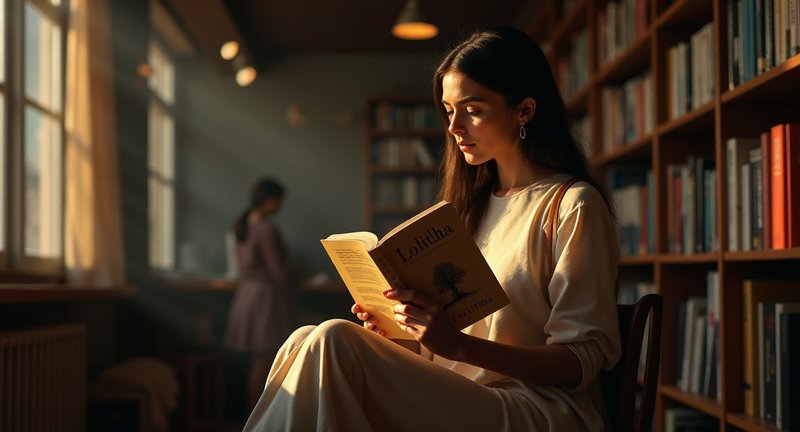Foreword to Novel Lolitha PDF
As I sat down to explore the intriguing world of the Novel Lolitha PDF, I couldn’t help but feel a rush of excitement. It’s not just another e-book; it’s a treasure trove of literary art waiting to be unveiled. Let me take you on a little journey through my personal reflections on this unique piece of work.
When I first stumbled upon the Digital edition of lolitha, I was captivated by its promise of adventure and complexity. Here’s what struck me most:
-
Intriguing Characters: Each character feels like an old friend, familiar yet oddly distant. Their journeys intertwine in ways that evoke both empathy and curiosity.
-
Rich Imagery: The prose is a canvas, painting vivid scenes that transport you to far-off places. I found myself lost in the landscapes described, almost as if I could feel the wind against my skin.
-
Thought-Provoking Themes: The novel challenges societal norms and invites readers to question their own beliefs. It’s the kind of book that leaves you pondering long after you’ve turned the last page.
Navigating the pages of this PDF felt like stepping into a world where every line is carefully crafted, where each word bears weight. I remember curling up on my couch, a cup of tea in hand, completely absorbed in its pages, losing track of time.

If you’re seeking a literary experience that stimulates the mind and stirs the heart, I wholeheartedly recommend diving into the Lolitha e-book version. It’s a journey well worth taking one that might just leave a lasting imprint on your literary soul.
The Insights of Novel Lolitha PDF
Diving into the world of literature often feels like embarking on a treasure hunt. Each page turned is like unearthing a gem that illuminates the path of creativity.
Recently, I stumbled upon a fascinating tale that whisked me away into a realm of vibrant characters and whimsical narratives. The unique storytelling method truly captivated my imagination.
What struck me most was the author’s ability to weave intricate emotions into simple moments. It’s as if every sentence is a brushstroke on the canvas of the reader’s heart.
As I navigated through the twists and turns of the plot, I found myself reflecting on my own life experiences. The connections drawn between the characters and their journeys felt eerily familiar, resonating in a way that made me pause and ponder.

It’s incredible how a well-crafted narrative can ignite such introspection. Each chapter was a gentle nudge, urging me to explore not just the story, but also the depths of my own thoughts and feelings.
In sharing this experience, I encourage you to seek out stories that challenge your perspective and inspire your creativity. You never know what treasures lie within the pages, waiting to spark your imagination and breathe life into your hobbies.
So grab your favorite reading nook, settle in with a cozy blanket, and let the words transport you. You might just discover a new passion hidden among the lines.
Introduction to Lolitha
When I first stumbled upon Lolitha, I was intrigued by its unique allure. This novel isn’t just a book; it’s an exploration of the human psyche, beautifully intertwined with themes of desire, obsession, and the bittersweet nature of love. The narrative pulls you in like a tide, leaving you to ponder its deeper meanings long after you’ve turned the last page.
Here’s what I found captivating about Lolitha:
-
Complex Characters: Each character is meticulously crafted, inviting readers to dive into their motivations and vulnerabilities. You can’t help but feel a connection, even to those who may not seem likable at first.
-
Vivid Imagery: The author paints such vivid scenes that you can almost smell the flowers blooming in spring or feel the chill of a winter evening. This level of detail makes every moment come alive.
-
Thought-Provoking Themes: It prompts readers to confront uncomfortable truths about themselves and society. From longing to moral dilemmas, every page challenges your perspective.
Reading Lolitha is akin to stepping into a mesmerizing dream; you float through a world that feels both familiar and otherworldly. The prose dances gracefully, drawing you into its rhythm and allowing you to experience the highs and lows of the characters’ journeys.
If you’re searching for a novel that will leave you contemplating its implications, Lolitha should undoubtedly be on your list. Its ability to evoke emotions and provoke thought is what makes it a timeless piece of literature.
Overview of the Storyline
When diving into the world of ‘Lolitha,’ you’re not just opening a book you’re stepping into a vibrant context of complex characters and provocative themes that linger long after you’ve turned the last page. The storyline revolves around the enigmatic relationship between Humbert Humbert and the young girl, whom he refers to as Lolita. This narrative unfolds in a manner that is both captivating and unsettling, weaving through themes of obsession, desire, and the painful beauty of lost innocence.
Here’s a snapshot of what to expect from this intricate storyline:
-
Unconventional Narration: The tale is recounted through Humbert’s perspective, allowing readers a glimpse into the mind of a deeply flawed character. His voice is both poetic and disarming, pulling you into a world where morality blurs.
-
Contrasting Settings: From the quaint American suburbs to the vastness of road trips across the country, the settings serve as a backdrop for the emotional turmoil and existential questions posed throughout the narrative. It’s as if every location enhances the tension between freedom and entrapment.
-
Compelling Themes: Love, lust, and manipulation intertwine in a way that forces readers to grapple with their own perceptions of right and wrong. It’s a thought-provoking experience that might have you re-evaluating your own beliefs about relationships.
-
Complex Characters: Humbert and Lolita are not mere archetypes; they are rich, multifaceted beings whose journeys evoke both sympathy and revulsion. Their interactions are layered with a mix of vulnerability and power.
As you clarify this storyline, be prepared to question, reflect, and feel a journey that, in my experience, leaves an indelible mark on the heart and mind.
Main Characters in the Novel
When I think about the main characters in a certain well-known work, I’m often struck by how they represent the complex layers of human experience. Each character serves as a vessel for exploration, drawing us into their intricacies and dilemmas. It’s fascinating how a few strokes of a pen can breathe life into someone who feels like they could step right out of the page.
Take, for instance, the enigmatic protagonist who dances on the edge of innocence and experience. Their struggles and aspirations reflect our own hidden battles, whispering to us in moments of quiet reflection. I find myself captivated by the way they navigate a world that seems both tantalizing and treacherous.
Then there are the supporting characters, each one a unique brushstroke on the canvas of the story. They amplify the protagonist’s journey, introducing vibrant shades of joy, conflict, and heartache. Have you ever noticed how certain side characters linger in your mind long after you’ve turned the last page? It’s as if they’ve woven themselves into the fabric of your thoughts.
What I love most is how these characters embody universal themes. Their flaws and triumphs resonate deeply, reminding us that we are not alone in our experiences. I’ve often found solace in their stories, as if they were friends offering understanding in a chaotic world.
In the end, the beauty lies in the journey of understanding these characters. Their lives are a mirror reflecting our own desires, fears, and dreams. So, as you dive into this world, I encourage you to savor every moment with them. Each encounter is a chance to learn something new about ourselves.
Themes Explored in Lolitha
When diving into the rich context of themes explored in Lolitha, I find myself awash in a sea of intricate ideas that linger long after the last page is turned. This work doesn’t just tell a story; it unveils a kaleidoscope of human experiences and emotions. Let’s unravel some of these captivating themes together:
-
Desire and Obsession: At the heart of Lolitha is a profound exploration of longing. The characters’ desires often spiral into obsession, raising questions about the nature of love and the thin line between admiration and fixation.
-
Identity and Transformation: The journey of self-discovery is prominent, illustrating how experiences shape our identities. The characters undergo significant transformations, forcing us to consider how our past influences our present.
-
Moral Ambiguity: This work challenges conventional notions of right and wrong. The characters operate in shades of gray, prompting us to reflect on our own moral compass. What is justice when viewed through different lenses?
-
The Passage of Time: Time’s relentless march is a poignant theme, underscoring how moments can slip through our fingers like grains of sand. The narrative captures fleeting instances that resonate deeply, compelling us to savor the present.
-
Cultural Reflections: Embedded in the story are sharp observations about societal norms and cultural expectations. These reflections serve as a mirror, prompting readers to evaluate their own worldviews.
As I traverse through Lolitha, I’m reminded that literature is not just about the plot but about the profound themes that resonate with our very souls. It’s a reminder that in the essense of storytelling, every page turned is an invitation to reflect on our own lives.
Why Read Lolitha?
When I first revealed Lolitha, I found myself swept away by its layers and complexities. This isn’t just a book; it’s an experience that challenges your perceptions and immerses you in its world. So, why should you read Lolitha? Here are a few compelling reasons from my journey:
-
A Masterclass in Language: The prose is nothing short of poetic, each sentence a crafted gem. The author dances with words, inviting you to relish the rhythm of the narrative. You’ll find yourself pausing, just to savor the language.
-
Complex Characters: The characters are rich tapestries woven with flaws and virtues. They are relatable yet enigmatic, making you ponder their choices long after you’ve turned the last page. You might even see a bit of yourself in them, which can be both enlightening and unsettling.
-
Exploration of Themes: Lolitha dives into themes of obsession, morality, and the human condition. It provokes questions that resonate deeply, challenging societal norms and inviting introspection. Reading it can feel like a personal awakening.
-
Visual Imagery: The vivid descriptions transport you to different realms. You can almost feel the textures, hear the sounds, and see the colors painted through words. It’s not just a story; it’s a full-sensory experience.
-
Unconventional Storytelling: The narrative structure defies expectations, often leading you down unexpected paths. This keeps you engaged and craving more, as you wonder what twists lie ahead.
So, if you’re ready to embark on a literary adventure that will stay with you, give Lolitha a chance. It’s a journey worth taking.
The Comprehensive Truth About Novel Lolitha PDF
When figuring out the world of literary treasures, there’s always a thrill that comes with uncovering something unique. I remember the first time I stumbled upon a digital format of an intriguing story that promised a captivating blend of emotion and adventure. It was like unearthing a hidden gem among the countless titles floating in the vast ocean of e-books.

So, what’s the allure of these unique stories? Here’s a quick rundown:
-
Accessibility: The beauty of digital formats lies in their convenience. I can carry an entire library in my pocket, ready to explore at a moment’s notice. Whether lounging on my couch or traveling across the globe, captivating tales are just a tap away.
-
Engaging Storytelling: Many narratives today dive deep into the complexities of human relationships and fantastical worlds. They challenge my perceptions, tug at my heartstrings, and ignite my imagination in ways I never expected.
-
Rich Characters: It’s the characters that often make or break a story. Those I’ve encountered in these digital pages have become companions in my journey, each offering a glimpse into their worlds and struggles.
-
Evolving Formats: Let’s not forget the joy of different reading experiences. Some stories come alive through illustrations, while others have interactive elements that make the tale even more immersive. It’s like having a conversation with the narrative itself.
As I navigate this digital landscape, I can’t help but feel grateful for the myriad of options available. Each discovery is a new adventure, and I invite you to join me in this quest for compelling narratives that resonate deeply within our hearts.
Legal Considerations for Downloading Literature
Navigating the labyrinth of legal considerations when downloading literature can feel like a daunting task. I remember the first time I stumbled upon a ‘Novel Lolitha PDF’ and was filled with excitement, yet a whisper of uncertainty crept in.
In our digital age, the allure of a free download is strong, but I quickly learned that not all that glitters is gold. Copyright laws are complex and vary from one jurisdiction to another. Downloading literature without the proper permissions can lead to unforeseen consequences.
I’ve had my fair share of close calls, and it made me realize how crucial it is to understand the rules of the literary jungle. Always check if the content is in the public domain or available under a Creative Commons license. This not only protects you but also respects the authors who poured their hearts into their work.
Sometimes, I find myself pondering the fine line between accessibility and infringement. It’s an important conversation to have, especially in a world where knowledge should be shared and cherished.
When downloading works like ‘Lolitha digital edition,’ consider using reputable sources. Libraries often offer digital borrowing options that allow you to access books legally without risking a copyright violation.
Also, being an informed reader is empowering. Embrace the joy of literature while being mindful of the legal landscape surrounding it. It’s about enjoying the journey without the shadows of legal troubles lurking behind you.
Recommended Online Sources for E-books
As it relates to exploring the digital landscape of e-books, I’ve stumbled upon some hidden gems that have truly transformed my reading experience. These online sources are more than just repositories; they are gateways to adventures waiting to unfold at your fingertips.
One of my personal favorites is a platform that offers a delightful blend of classic literature and contemporary works. The joy of finding a beloved story nestled among lesser-known titles is like discovering a rare jewel in a thrift shop. It’s thrilling to know that each click could lead to an unexpected journey.
I’ve also found that some libraries have expanded their horizons to include a robust selection of e-books. The convenience of borrowing from the comfort of your couch while sipping your favorite beverage is unparalleled. Plus, many of these platforms allow you to reserve titles, ensuring you never miss out on the latest buzz.
For those who crave something a bit different, there are websites dedicated to independent authors and unique narratives. Diving into self-published works often feels like exploring an uncharted island; you never know what treasures you might unearth. It’s refreshing to support emerging voices and discover stories that might not hit mainstream shelves.
Also, subscription services have become my trusty companions. Imagine a vast sea of literary possibilities, all available for a small monthly fee. With just a few taps, I can immerse myself in different genres and styles, broadening my horizons with every page turned.
So, whether you’re seeking classics or the latest indie sensations, these online sources have something for everyone. Your next great read could be just a click away.
How to Search for PDFs of Literary Works
In my quest to unearth the literary gems hidden in the vast sea of the internet, I often find myself navigating the intricate web of PDF searches. It’s like embarking on a treasure hunt, where each keyword is a clue leading me closer to that coveted text.
I’ve discovered that using specific phrases can elevate your search game. Instead of generic terms, I recommend diving deep into the author’s name or even the book’s themes. You’ll be surprised how a few well-chosen words can unlock digital libraries.
Don’t shy away from niche websites and forums. These often overlooked corners of the internet can be goldmines for finding the literary works you seek. Fellow enthusiasts frequently share links and resources, creating a supportive community that thrives on mutual discovery.
Another tip from my journey is to explore educational resources. Universities and educational institutions often have extensive databases. You might just stumble upon a digitized version of a literary classic while browsing through a course reading list.
And let’s not forget about utilizing online academic databases. Many provide access to a plethora of scholarly articles and books, sometimes for free. Just a little digging can yield rich rewards in the form of the literary works you cherish.
So, gear up for your search! Embrace the adventure of finding those PDFs. Each click could lead you to another world of words waiting to inspire and captivate you.
Using E-book Libraries for Access
Imagine having the universe of literature in your pocket. E-book libraries are like portals to worlds you’ve never even dreamed of, all just a few taps away. The convenience is unbeatable no more waiting for shipping or scouring used bookstores for that elusive title.
I’ve found these digital shelves to be a sanctuary for my curious mind. They’re filled with not just popular bestsellers but rare gems too. Ever stumble upon a classic that you hadn’t thought to explore before? It’s like opening a treasure chest of forgotten stories.
And let’s talk about access no library card required, no late fees haunting you like unpaid bills. Instead, you’re free to browse and download instantly, often for free or at a fraction of the cost of print. It’s a paradise for the restless reader.
With e-book libraries, you’re also not confined to one type of device. Whether it’s your tablet, phone, or e-reader, you can switch between them like a literary chameleon, never missing a beat. It’s the ultimate convenience for someone always on the go.
Even obscure works you’d never find on dusty bookshelves can be discovered digitally. I’ve stumbled upon titles that feel like well-kept secrets, waiting to be unlocked. It’s like getting an invitation to a private, virtual book club, no RSVP needed.
If you’re someone who loves to dive into different genres, e-book libraries give you that freedom. No need to commit to one at a time dabble in sci-fi in the morning and then drift into historical fiction by night.
Tips for Finding Rare Novels Online
In relation to hunting down rare novels online, I’ve been down quite a few rabbit holes. There’s something thrilling about tracking that elusive edition, almost like piecing together a literary treasure map.
First, patience is your best friend. I’ve found that setting up alerts on various second-hand book websites or forums can make all the difference. Don’t forget to cast your net wide there are hidden gems on niche platforms.
Exploring international websites is another trick. Sometimes the exact version you’re after could be lounging in a bookstore halfway across the world, just waiting to be discovered. Language barriers? They add to the charm of the chase.
Always, always read the descriptions carefully. Sellers love to sprinkle in details, and sometimes, these tiny clues help distinguish a hidden first edition from the sea of reprints. I’ve lost count of the times a well-written seller description saved me from a faux pas.
Don’t be afraid to dive into forums or social media groups. Many of the rarest books don’t make it to mainstream sites. Fellow collectors often exchange tips or even post their own hidden stock for sale.
And remember, the journey is half the fun. If you treat it like an adventure, you’ll find that even the ‘failures’ become part of the experience, adding stories to your collection.
Understanding Copyright and E-book Availability
When dealing with understanding copyright and e-book availability, I’ve spent countless hours navigating the peculiar rules that seem to define the digital literary world. If you’ve ever wondered why you can’t find certain books in e-book format, even decades after they were published, you’re not alone. Copyright is often the culprit behind the mystery, and let me tell you it’s a tangle of legal red tape.
First, it’s essential to know that copyright laws can lock down a book for up to 70 years after the author’s death. So, while some older works slip into the public domain, many still sit securely in the hands of publishers or the author’s estate. This means that availability especially for classic novels isn’t always about demand; sometimes, it’s about legalities.
Here’s what I’ve learned about navigating this world of e-book availability:
-
Copyright Expiration: Older works enter the public domain, making them freely available, but the timeline varies from country to country. Some works you’re itching to read just aren’t free yet. Frustrating, right?
-
Digital Rights Management (DRM): Even if an e-book is available, DRM can restrict where and how you read it. No passing your digital novel around like a paperback!
-
Out-of-Print Titles: Just because a book is out of print doesn’t mean it’s in the clear for digital distribution. Sometimes, the digital rights are tied up, and no one is in a rush to release them.
-
E-book Exclusivity: Some e-books are only available through specific retailers due to exclusivity agreements. It’s like a treasure hunt, but without the map.
It’s all about patience and a bit of clever digging. Trust me, I’ve spent late nights chasing down those elusive digital copies, only to discover they’re still wrapped in layers of copyright protection.
Community Forums for Book Recommendations
I’ve always believed that the best book recommendations don’t come from dusty shelves but from living, breathing conversations. That’s where community forums have become my personal literary oasis. They’re a place where fellow readers gather like a secret society, whispering their latest discoveries and hidden gems. If you’re not part of one, you’re missing out on the heartbeat of modern reading culture.
The beauty of these forums lies in their unpredictability. One moment, you might be discussing a classic; the next, you’re deep in conversation about a book that defies genres. It’s like falling down a rabbit hole, except this one leads to a world of endless literary possibilities. Plus, there’s something thrilling about knowing you’re not the only one obsessed with the nuances of a storyline.
I’ve often found myself wandering into the corners of these communities, where people drop book titles like breadcrumbs. Following those trails has led me to unexpected places, where stories feel handpicked just for me. It’s like treasure hunting, but instead of gold, you’re finding characters and worlds that stay with you long after the final page is turned.
What makes these spaces even more special is the interaction. When someone recommends a book, they’re sharing a piece of themselves. And isn’t that what we all want? To connect, to bond over a story, to know we’re not alone in our literary quirks? Dive into a forum, and you’ll see it’s not just about finding the next read. It’s about finding your people.
What You Need to Know
Is the book Lolita banned?
‘Lolita,’ written by Vladimir Nabokov, has faced bans and challenges in various places since its publication in 1955. The book’s explicit themes of pedophilia and obsession have led to significant controversy, resulting in its prohibition in several schools and libraries across the United States and other countries. Some countries have imposed outright bans, while in others, the book has been available but frequently challenged for its sensitive content. Despite the bans, ‘Lolita’ remains a significant work in literary discussions due to its complex narrative and exploration of taboo subjects.
Why is Lolita controversial?
‘Lolita’ is controversial primarily due to its exploration of themes surrounding sexual obsession, manipulation, and the abuse of a young girl by an adult man, Humbert Humbert. The novel gets to the bottom of the psychological complexities of Humbert’s obsession with the titular character, prompting discussions about morality, consent, and the nature of love. Critics argue that the book can be interpreted in various ways some view it as a critique of obsession, while others believe it glamorizes predatory behavior. The ambivalence in Nabokov’s writing forces readers to confront uncomfortable realities about desire and exploitation.
Why was Lolita crying in the hotel room?
In ‘Lolita,’ the scene where Lolita cries in the hotel room symbolizes her deep emotional turmoil and the pain caused by her traumatic experiences. Humbert’s controlling and abusive behavior has left her feeling trapped and isolated. Her tears reflect a mixture of confusion, fear, and a longing for freedom. The hotel room serves as a microcosm of her constrained existence under Humbert’s manipulative hold, illustrating the loss of her childhood and the emotional scars resulting from their tumultuous relationship. This poignant moment emphasizes her vulnerability and the tragic consequences of Humbert’s actions.
What is the main message of Lolita?
The main message of ‘Lolita’ revolves around the complexities of obsession, the nature of love, and the profound effects of trauma. Nabokov crafts a narrative that challenges readers to grapple with their moral judgments as they witness Humbert’s justifications for his actions. Through this controversial relationship, the novel explores themes of manipulation, loss of innocence, and the blurred lines between passion and abuse. Also, ‘Lolita’ invites readers to reflect on the darker aspects of human desire while also revealing the devastating impact of exploitation on a vulnerable individual.
Who did Lolita run away with?
Lolita ultimately runs away with a character named Dickon, who represents a fleeting escape from her troubled existence with Humbert. This act of running away highlights her desire for independence and a life free from Humbert’s oppressive grasp. Dickon symbolizes youthful innocence and a sense of normalcy, contrasting sharply with the trauma Lolita experiences. Her choice to leave with him underscores her quest for autonomy and a desperate attempt to reclaim some semblance of a normal childhood, albeit in a complicated and dangerous context.
What will happen to Lolita’s body?
The fate of Lolita’s body, both physically and symbolically, is a crucial aspect of the narrative. Throughout ‘Lolita,’ her body is objectified by Humbert, reducing her to a mere possession in his twisted desire. After the traumatic experiences she endures, Lolita’s body represents the scars of her abuse and loss of innocence. As she grows older, it becomes evident that her body will carry the weight of her past experiences, serving as a constant reminder of her victimization. Also, her physical state reflects her psychological scars and the ongoing struggle for agency in a world that has betrayed her.
Does Humbert regret what he did?
Humbert Humbert’s feelings of regret are complex and often ambivalent. Throughout the narrative, he oscillates between acknowledging the wrongness of his actions and justifying his obsession with Lolita. At times, he expresses remorse for the pain he has inflicted on her, recognizing the consequences of his manipulation and control. However, his regret is often overshadowed by his self-serving desires, revealing a conflicted psyche that struggles to accept full responsibility for his actions. Also, while there are moments of clarity, Humbert’s regret is complicated by his inability to fully grasp the impact of his obsession on Lolita’s life.
What is the Lolita effect on society?
The ‘Lolita effect’ refers to the phenomenon where the sexualization of young girls is normalized or romanticized in society, often leading to harmful stereotypes and expectations. This term draws from Nabokov’s portrayal of Lolita, wherein her character embodies both innocence and sexual allure. The effect can be seen in various cultural contexts, including media, fashion, and social attitudes towards young women. It raises critical questions about the portrayal of femininity and sexuality, urging society to confront the implications of glorifying such relationships, ultimately leading to discussions about exploitation and the necessity for protecting vulnerable individuals from predatory behavior.
What is the reason for Lolita fashion?
Lolita fashion, originating in Japan, is characterized by its feminine and elaborate clothing styles that often draw inspiration from Victorian and Rococo aesthetics. The style aims to create an innocent, youthful appearance, often incorporating petticoats, lace, and floral motifs. While the name ‘Lolita’ evokes Nabokov’s controversial character, the fashion movement primarily focuses on empowerment and self-expression rather than the themes of the novel. Many enthusiasts embrace this style as a form of rebellion against societal norms regarding femininity, allowing for creativity and individuality in a space that celebrates innocence and nostalgia.
Who was in love with Lolita?
Throughout ‘Lolita,’ Humbert Humbert is the primary figure who expresses a distorted and obsessive love for Lolita. His infatuation is rooted in a deep psychological fixation that ultimately manifests as manipulation and control rather than genuine affection. However, there are moments in the narrative where Lolita shows interest in other characters, including her brief connection with Dickon. These fleeting relationships contrast with Humbert’s possessive love, illustrating Lolita’s desire for normalcy and freedom from Humbert’s dominance. Also, the dynamics of love in the novel are complex and reveal the tragic consequences of Humbert’s obsession.
Are Humbert and Quilty the same person?
Humbert Humbert and Clare Quilty are not the same person, but they serve as contrasting characters within the narrative. Humbert is the protagonist and narrator, whose obsessive love for Lolita drives the story. In contrast, Quilty is depicted as a playwright and Humbert’s rival for Lolita’s affections, representing a different facet of predation and exploitation. Quilty’s character illustrates the societal indifference to Lolita’s suffering, as he is a figure who also objectifies her. Their interactions underscore the themes of obsession and manipulation, emphasizing the complexity of their relationships with Lolita and the destructive nature of their desires.











Your comment was recorded and is awaiting moderation.